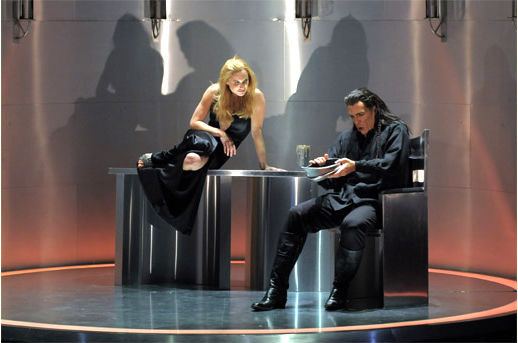
Her recent (Shakespeare) Macbeth at CST, for instance, gave us a male witch giving birth on a table in a cabaret, Lady Macbeth dying in a bathtub, and a Porter speech rewritten into a modern stand-up routine. Even more appalling was last year’s Richard III, which could give the Richard Dreyfus “Goodbye Girl” version a run for its money.
Judging by the matinee of LOC’s production of the Verdi tragedy on October 24, Ms. Gaines has gotten her groove back. She has given us a flawed but riveting production, visually stunning and fascinating in its detail. James Noone’s moving metallic sets, Virgil C. Johnson‘s splendid costumes, and Robert Wierzel‘s effective lighting work together beautifully to support this early Verdi masterpiece.
Also stunning were Renato Palumbo‘s propulsive, flawless conducting and the precise, clear, brilliant playing of the orchestra and the singing of the Lyric Opera chorus under Donald Nally.
Debutante soprano Nadja Michael was a huge-voiced and very impressive Lady Macbeth. She seemed to be having a very good day indeed, with no sign of pitch problems. Her clarion soprano easily soared over the orchestra, and her physical characterization was absolutely fascinating—sultry sexuality combined with a dancer’s grace and that of a crouching tigress.
Thomas Hampson in the title role made the most of his intelligent baritone resources, though one longed for a bigger, more powerful sound in orchestral climaxes. He did a fine job of playing Macbeth’s descent, both mental and physical, and roused himself for a beautifully sung and phrased “Pieta, rispetto, amore” that garnered the biggest ovation of the afternoon.
Weak casting in the smaller roles, a frequent problem at Lyric, hampered the principal cast. The three Apparitions, for instance, were barely audible, as was Konstantin Stepanov‘s limp Malcolm, who appeared to be a mime. Stefan Kocan was only an adequate Banquo, while debuting tenor Leonardo Capalbo delivered a fine “Ah! La paterno mano” but was otherwise ineffective.
Gaines’ directorial touches were mostly successful. Her handling of the witches was exemplary, and I loved the banquet scene set with a hugely long, metallic table and a clearly drunk royal couple gradually losing their grip on reality as they lose their grip on their subjects. The tragic scene of the desperate subjects during “Patria oppressa” was filled with moving detail and specific moments.
Working less well were the witch’s snatching of Fleance and flying him away from the murderers (effect!) and worse, having Banquo’s ghost flop out of a lighting fixture that resembled a combination piñata and disco ball. Gaines also rather ducked the final battle scene by making it a choreographed dance of opposing flag-bearers. She might have done well to turn that scene over to fight director Robin McFarquhar, who did excellent work.
Despite these flaws, the overall impression of the matinee was powerful, passionate, and exciting. There was never a dull moment, and Verdi’s music was very well served. [Photo: Dan Rest]



